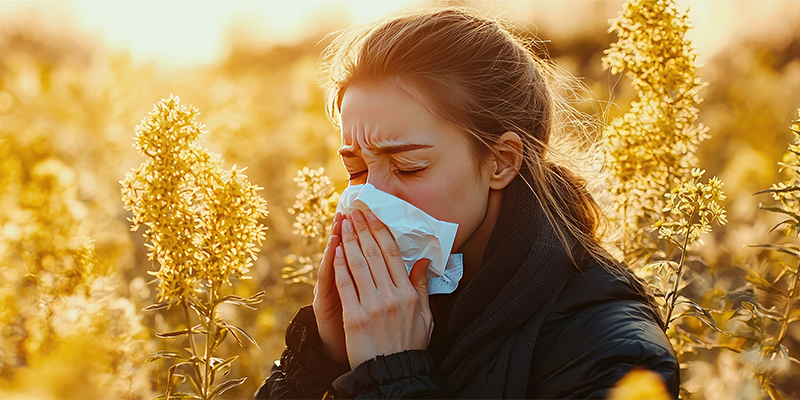
Hay fever, otherwise known as allergic rhinitis or seasonal allergy, occurs when the body’s defense system (immune system) reacts exceedingly to pollen, dust, mold, pet hair and so on. This results in symptoms of sneezing, a runny or blocked nose, itching one’s eyes, nose or throat and feeling tired. Hay fever may be triggered by pollen, pet dander, or even by dust known as dust allergy, leading to symptoms like sneezing and nasal congestion. Even though it’s common when you are exposed to your triggers or season change, for some it continues all around the year.
Symptoms of hay fever
The most common symptoms are nasal congestion, runny nose, sneezing, post nasal drip, stuffy nose, itching, phlegm, throat irritation and/ or tiredness. It can also cause pain in the ear, redness, puffy eyes, watery eyes, breathing through mouth and wheezing. It can have a significant impact on sleep, energy, concentration and childhood behaviour and learning.
Causes of Hay fever
As we have discussed already, allergens like pollen, dust. etc trigger the body to release histamines into the blood stream that triggers the symptom of hay fever. Pre-existing conditions like asthma, eczema, family history of respiratory allergy or asthma, can make you prone to hay fever.
What Ayurveda Says…
Ayurveda has identified hay fever elaboratively and grouped into a number of conditions called Pinasa (dominated by stuffy nose), Pratisyaya (dominated by nasal allergy symptoms) or Kshavadhu (dominated by sneezing) depending upon dominant symptoms and triggers.
As per Ayurveda poor gut health, dryness and accumulation of toxins are the major root causes of hay fever. We now know that the stomach is one of the major organs that releases histamine to blood. Along with the change of season (Ritu Sandhi in Ayurveda) further aggravate the symptoms.
Common symptoms of hay fever
According to Ayurveda, symptoms are dosha-specific.
Typical Kapha symptoms include nasal congestion or runny nose, light-headedness, puffiness around the eyes, and mucus accumulation in the nasal passages.
Pitta symptoms may include redness or a burning sensation in the eyes, irritability, yellowish mucus, and heat or flushing over the face.
Vata symptoms often involve sneezing, dry nasal passages, headache, and nervous restlessness.
Hay Fever Causes – Ayurveda Thought
According to Ayurveda, hay fever occurs due to an increase in phlegm and acidity in the system triggered by (imbalanced Pitta and Kapha), accompanied by weak digestion, which leads to the buildup of toxins known as Ama.
In addition, poor tissue quality leading to low immunity (Ojas), lack of seasonal routines, and the absence of regular cleansing are other contributing factors in today’s lifestyle.
From a holistic perspective, Ayurveda places equal emphasis on balancing the doshas (body humors), improving digestion, and strengthening the immune system for lasting relief.
Ayurvedic Treatment to Manage Hay Fever Naturally
There can be many of you that are struggling with hay fever throughout the year. Ayurveda offers effective natural treatments to address hay fever from root causes and live a symptom free life.
1. Nasya Therapy (Nasal Cleansing)
Nasya therapy is the sinus and respiratory cleanse that is administered after sinus massage, steam, nasal drops and herbal smoke. It helps to remove toxins from the nose, keep the nose moist, and protect the person from allergens.
2. Herbal Support
-Guduchi and Tulsi support the development of long-term immunity.
-Trikatu enhances digestive fire and promotes better metabolism.
-Sitopaladi churna, when mixed with honey, provides quick relief from allergy symptoms.
-Multiple Ayurvedic herbal combinations help to address symptoms
Daily Ayurvedic Practices for Hay Fever Relief
Nasal Rinse and Oil
Cleaning and Washing the nasal passages with warm saline water using a neti pot washes away dust and pollen. Putting a few drops of sesame or herbal oils within the nostrils can soothe and protect this delicate area from dryness and allergens. They help to scour allergens out of your nose. Usually, this method is advised in the morning or before bedtime.
Help Your Digestion
Warming spices like ginger, black pepper, and long pepper support digestion and help prevent the buildup of metabolic waste — a factor that often worsens allergic reactions.
Eat Warm and Light Diet
Types of Foods to Include:
- Soups – Light vegetable broths, lentil soups, or spiced clear soups.
- Stews – Mildly spiced stews with well-cooked vegetables or moong dal.
- Steamed Vegetables – Carrot, zucchini, spinach, pumpkin, ridge gourd, bottle gourd, etc.
- Cooked Grains – Warm rice, millet, or quinoa with ghee or light spices.
- Warm Herbal Teas – Cumin-coriander-fennel tea, ginger tea, tulsi tea. A warm tea made with cumin, coriander, and fennel gently supports digestive health.
Foods to Avoid:
- Dairy products (milk, curd, cheese) – increase mucus.
- Cold, raw salads – harder to digest.
- Fried or oily foods – aggravate Kapha and digestion.
- Sugary or processed items – can trigger inflammation.
- Reduce the use of tomato, garlic and fruits.
Herbal Teas are Your Friend
We believe hibiscus tea, basil, ginger, cumin, and fennel are not only pleasant to taste but also support digestion and help ease inflammation.
Stay Well-Hydrated
Drinking a good amount of warm water throughout the day helps flush out allergens from the body and prevents dryness in the nose and throat.
Go for Gentle Movements and Breathing
A balanced yoga routine combined with alternate nostril breathing helps clear nasal blockages and calms the nervous system.
Seasonal Cleanse (Panchakarma)
Seasonal detoxification is your ultimate answer for controlling allergy response from root causes substantially. It is beneficial for resetting the body, balancing the doshas, and strengthening long-term immunity.
Conclusion: Heal Hay Fever Naturally with Ayurveda
Ayurveda doesn’t just mask the symptoms—it focuses on the root causes like imbalanced doshas, weak digestion, and low immunity. By bringing these back into balance, it offers long-lasting relief and supports your body’s natural healing.
Tired of fighting allergies every season?
Book your initial consultation with our Ayurvedic experts at Liv Ayurveda. We’ll help you to design a personalized healing plan to stay balanced and allergy-free—naturally.
Connect us for more information



